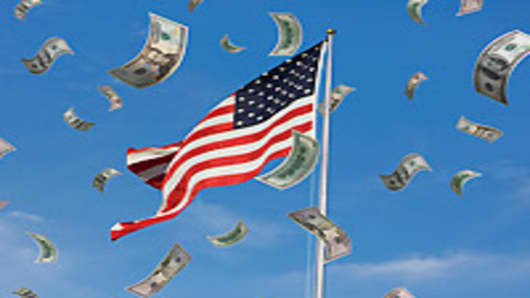Yet a consistent surge in energy and food prices as well as a seeming unwillingness in Washington to take serious measures to curb deficit spending have driven the drumbeat to a new crescendo, creating an “inflation effect” despite what academic evidence may show.
No less a voice than Warren Buffett weighed in Wednesday, telling CNBC in a three-hour interview that unless the American debt situation gets under control, inflation is the only destination.
“There’s no way you can run the kind of deficits we’re running—and this is true around the world—without it being enormously inflationary,” the Berkshire Hathaway chairman said. “No politician is going to come out and say we’re really going to solve this by making our money worth less. It would be suicide to do this (but) that’s the practical effect of the policies that are being followed now.”
Buffett couldn’t have been more pointed or eloquent.
He rejected the government metrics that insist inflation is in the mid-1 percent range, saying it was like someone jumping from the 50th floor, passing 45 stories and assuming everything is OK so far.
“You should not judge the success of your effort by where you are that this point,” Buffett said.
Bernanke spent a good portion of his congressional testimony this week assuaging legislators’ fears that the Fed was building a stealth nuclear inflation bomb.
“The most likely outcome is that the recent rise in commodity prices will lead to, at most, a temporary and relatively modest increase in US consumer price inflation,” he said during Tuesday’s portion of the hearings.
There is one problem, however, with the chairman’s statement: He can’t possibly know whether it’s true.
Bernanke is a smart guy, no doubt. He is as good an economic historian as you’ll find, and he’s hoping that history is telling him this price inflation jump is just a blip and not indicative of worse things to come.
But he can’t know what’s going to happen in the Middle East. Because the growth of emerging markets is something new, he can’t know what effect it will have on global demand for commodities. And he can’t know what effect the nearly $3 trillion in Fed stimulus will have on the economy, because we’ve never had $3 trillion in Fed stimulus before.
Still, there is little indication the central bank is changing course, and that is sparking concern around the markets.
In Wednesday’s edition of “The Gartman Letter,” hedge fund manager Dennis Gartman, reasoning that food and energy inflation is, in fact, inflation, addresses shortcomings in the Bernanke analysis:
“The Fed Chairman seemed all too willing to write off the current global price increases of food and energy as simply the result of exogenous market circumstances…His response strongly suggested that the Fed and staff see these current high prices (as) cyclical rather than catholic in nature, and can therefore be whisked away with the waft of the back of a central banking hand. It was as if Dr. Bernanke was willing and quite able to deny, if not entirely denigrate, the impact of these prices upon the domestic and global economies and it was this we found disconcerting.”
As Bernanke spoke, gold prices reached new historic highs, crude oil was back over $100 a barrel and the stock market continued to play teeter-totter with inflation expectations—oil goes up, stocks go down and vice versa.
If Buffett is right, inflation has the inside rail in this horse race.
“I think if you’ve got a very important problem whether it’s in business, whether it’s in your personal life, whatever it may be, you address it properly,” he said, later adding, “You’ve really got to start modifying promises you’ve made for the future or you’ve got to admit you’re going to inflate your way into solving those problems. We really haven’t done that.”
______________________________________
Questions? Comments? Email us at NetNet@cnbc.com
Follow Jeff @ twitter.com/JeffCoxCNBCcom
Follow NetNet on Twitter @ twitter.com/CNBCnetnet
Facebook us @ www.facebook.com/NetNetCNBC



